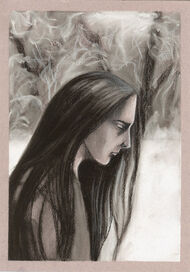Daeron (also spelled "Dairon") was a Sindarin elf of Doriath and King Thingol's loremaster and minstrel. Because of his love for Lúthien, he was jealous of Beren One-hand, and was a key figure in the betrayal of their love to Thingol.[1]
Daeron was a brilliant loremaster and was the greatest musician in Middle-earth. Second to him was Maglor, one of Feanor's sons.[1]
Biography
Daeron was born in Middle-earth at some undetermined time. Following the folk of Elwë, he became an important elf close to King Thingol, serving as his loremaster and minstrel. He devised the Cirth (familiarly known as Runes), which would later become an important writing form.[2]
Daeron and Mablung both attended the Mereth Aderthad to bear greetings from their King.[3]
He loved Thingol's daughter, Lúthien, more than anything, devising music in her honor and often played it while she danced. However, she did not return his affections. Twenty years after the Return of the Ñoldor, he attended the Mereth Aderthad with his kinsman Mablung bearing gifts and greetings to the Ñoldor from the King of Doriath. Hundreds of years later when Beren came to Doriath, Lúthien and Beren fell in love, though they kept it secret from Thingol, knowing he would not approve of his daughter promising herself to a mortal. However, Daeron's jealousy of their love for each other caused him to spy on them both and report what he saw and heard to Thingol.[1]

Daeron's sorrow, by Filat
Later, when Lúthien learned that Sauron had imprisoned Beren, she sought Daeron's counsel but he betrayed her to the king, causing her to be imprisoned in Hírilorn. After she had escaped and went away to find Beren and was feared to be lost, Daeron repented his previous deeds and left Doriath to search for her in vain. He lost his way somewhere in the far East of Middle-earth, where he dwelt in dark places lamenting his love for Lúthien. His fate or whereabouts afterwards in the world are not known.[1]
Legacy
His invention of the Cirth provided an alphabet of runes that the Dwarves adopted in their writings and spread throughout Middle-earth, passing them down from age to age. These runes would later become the script used in Moria and were known as Daeron's Runes.[4]
Etymology
His name is derived from the Sindarin word daer ("large, great").
In earlier etymologies of the legendarium the Doriathrin name is given as Dairon, of which the root was the Doriathrin word for shadow, dai. Consequently, Christopher Tolkien speculated in The Silmarillion that the name perhaps included the Sindarin word dae "shadow".
See Also
Translations around the World
| Foreign Language | Translated name |
|---|---|
| Amharic | ዻአሮን |
| Arabic | ضايرون |
| Armenian | Դաերոն |
| Belarusian Cyrillic | Даерон |
| Bengali | ডাএরন |
| Bulgarian Cyrillic | Даерон |
| Georgian | ძაერონი |
| Greek | Ντάερον |
| Gujarati | ડએરોન |
| Hebrew | דאירונ |
| Kazakh Cyrillic | Даерон |
| Hindi | डएरोन |
| Kannada | ಡರೊನ |
| Korean | 대론 ? |
| Kyrgyz Cyrillic | Даэрон |
| Macedonian Cyrillic | Даерон |
| Marathi | डेरोन |
| Mongolian Cyrillic | Даерон |
| Nepalese | डएरोन |
| Pashto | ضاېرون |
| Persian | ضاهرون ? |
| Punjabi | ਡੇਰੋਨ |
| Russian | Даэрон |
| Sanskrit | डएरोन् |
| Serbian | Даерон (Cyrillic) Daeron (Latin) |
| Sinhalese | ඩැරොන් |
| Tajik Cyrillic | Даерон |
| Tamil | தேரோன் ? |
| Telugu | డఎరొన |
| Ukrainian Cyrillic | Даерон |
| Urdu | دایراون |
| Uzbek | Даерон (Cyrillic) Daeron (Latin) |
| Yiddish | דאַעראָן |
References
- ↑ 1.0 1.1 1.2 1.3 The Silmarillion, Quenta Silmarillion, Chapter XIX: "Of Beren and Lúthien" Cite error: Invalid
<ref>tag; name "luthien" defined multiple times with different content Cite error: Invalid<ref>tag; name "luthien" defined multiple times with different content Cite error: Invalid<ref>tag; name "luthien" defined multiple times with different content - ↑ The Silmarillion, Quenta Silmarillion, Chapter X: "Of the Sindar"
- ↑ The Silmarillion, Quenta Silmarillion, Chapter XIII: "Of the Return of the Noldor"
- ↑ The Complete Guide to Middle-earth
